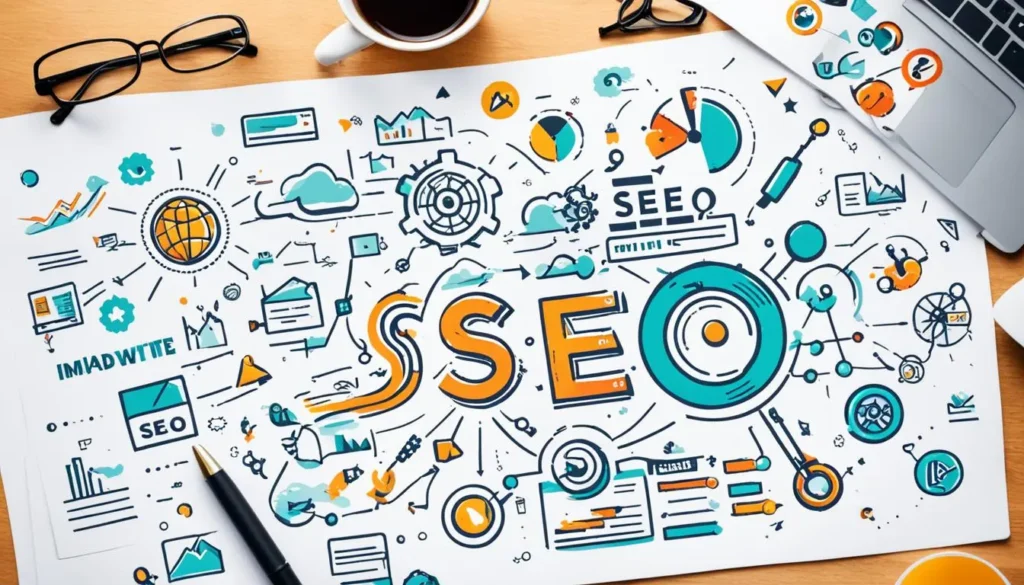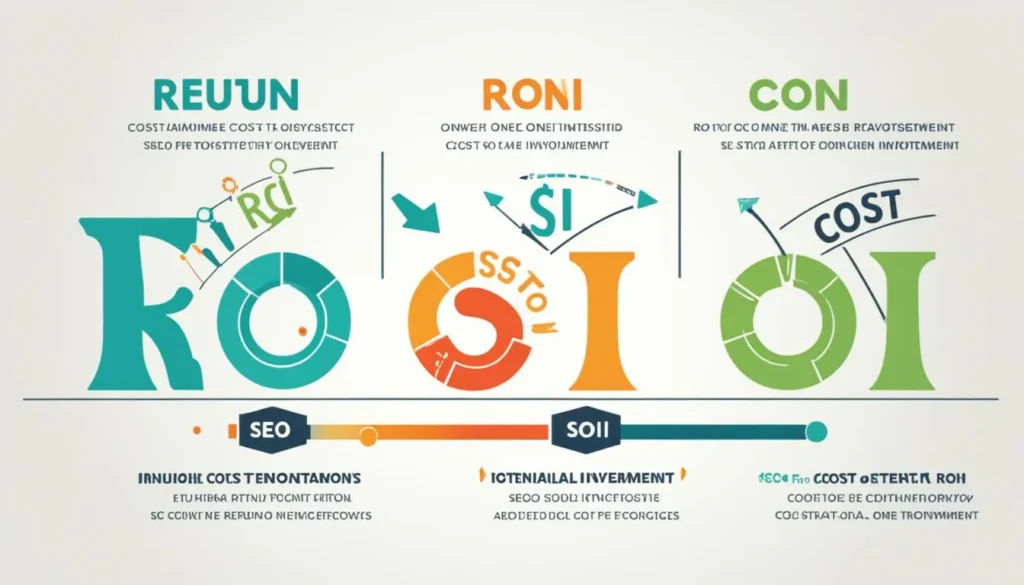Is your website hard to find online? Imagine a way to stand out without spending a fortune on ads. That’s where SEO comes in. SEO, or search engine optimization, is much more than ranking high on Google. It’s about creating a strong, easy-to-find online presence that fits what your visitors are looking for. Understanding SEO is the first step towards winning at your online game1.
Think of SEO and real estate in the same light—location matters a lot. Just like a funny meme can go viral, good SEO can push your website into the spotlight. With the right SEO approach, even a single interesting post can bring a flood of visitors to your site. And the best part? They come through Google for free1.
But, making a lasting impact takes time and ongoing effort. SEO isn’t a quick fix; it’s a journey. By integrating SEO into your online strategy, you’re planting seeds that will grow your online presence over years. A well-executed SEO strategy helps your site thrive in the mobile era and makes Google notice you2.
What’s cool about SEO is that everyone has a fair shot. It’s not just for big companies with deep pockets. Even with smaller budgets, focusing on what users love, like fast websites and mobile friendliness, can help you stand out online. This shows how SEO is open to anyone who’s willing to invest some effort13.
Key Takeaways
- SEO meaning transcends mere visibility; it’s a blend of strategy and storytelling to captivate the intended audience.
- Investing in SEO is cost-effective over time, offering a higher ROI and a continuous flow of quality traffic without constant spending1.
- Content is king in the SEO realm, driving engagement and clicks organically through quality and relevance1.
- SEO requires an adaptability mindset, accommodating frequent search engine algorithm updates to maintain digital prominence2.
- Mobile optimization is not an option; it’s a necessity for capturing the majority of internet users and adhering to Google’s preferences23.
- Long-term investment in SEO builds and grows website visibility, fostering sustained success in the digital marketplace1.
Introduction to Search Engine Optimization (SEO)
What is SEO, you ask? It’s a method that makes a website better for both search engines and people. By doing this, it helps the site show up more in search results. This is very important in a world where everyone is fighting for online attention4. SEO isn’t just about getting noticed. It’s about making sure users have a great experience when they visit your site, which is key for success online.
People often begin their online shopping on Amazon, with 61% of U.S. shoppers doing so4. This fact shows how important it is to have a good search strategy. SEO connects what a business offers with what people are looking for. For example, while Google gets many searches each day5, a large part of website visits come from simple, unpaid searches4. This shows that both paid and unpaid search results are crucial for bringing the right people to websites.
The SEO industry is growing fast and is expected to be worth $122.11 billion by 20284. It focuses on different types of SEO like making sure the website is technically sound, that its content is right, and building links from other sites4. This industry uses many strategies to promote websites. These include things like improving the brand’s image, using PR to spread the word, and content marketing. All these methods work together to make SEO successful4.
So, what does SEO explained really mean? It’s about knowing how search engines work and using this knowledge. If done right, even small changes can boost a site in search results. Google is a great example, as it’s hugely popular worldwide with about 83% of the search market5. This shows the huge impact SEO can have. It proves that even the tiniest tweaks in a site’s content or design can really change how many people visit the site and its success.
SEO Meaning: Why It’s the Keystone of Digital Visibility

SEO meaning is deeply linked to making websites more seen. By doing this, more people can find the site. This matters a lot because more than half of website traffic comes from searches4. Understanding SEO meaning means knowing how to get a site noticed without needing to pay, which greatly helps businesses reach more people.
Knowing the SEO meaning also points out its impact on business goals. Strong SEO can bring the right visitors to a site, helping to make sales and meet other important aims4. And since many online shoppers start their searches on Amazon, having the right SEO for big online shops is key.
SEO also helps a brand build confidence and recognition. Being visible in search results means more people trust the brand and see it as an expert. This becomes vital for lasting success4. With the SEO industry growing fast, it’s clear its value is increasing every year4.
| Platform | Percentage of Shoppers Starting Search |
|---|---|
| Amazon | 61%4 |
| Walmart.com | 32%4 |
| YouTube | 20%4 |
| 19%4 | |
| 15%4 | |
| TikTok | 11%4 |
Since SEO is all about making a website stand out in searches4, it shows how important it is. For any business to do well online, good SEO is not a choice but a must.
Increased Visibility and Traffic: The Lifeline for Websites
In today’s world, making your website more visible is key to drawing in important, natural traffic. Many businesses are online, so having a strong SEO plan is a must. Ongoing SEO efforts help keep the flow of visitors steady, which is crucial for every online business.
Keyword Optimization: The Path to Enhanced Visibility
Choosing the right keywords makes sure your message gets to the right people. This increases how often your site pops up in searches. It’s about finding the words your customers use, so your business is easily found6. This way, you draw in visitors actually looking for what you offer6.
Organic Traffic: A Sustainable Growth Driver
Organic traffic comes from search results, not ads, showing your site fits what users are searching for. It’s a great way to meet potential customers without spending a lot. By improving your site’s design and speed, you give users a better experience and search engines a reason to show your site more6.
SEO helps businesses grow by increasing their online traffic. It also makes the online experience better for users. With good SEO, even smaller businesses can stand out against big competitors6.
| SEO Focus Area | Benefits |
|---|---|
| Keyword Optimization | Targets relevant search queries, improving visibility and rankings |
| User Experience Optimization | Increases visitor satisfaction and aids in higher SERP placements |
| Organic Traffic Acquisition | Delivers sustained growth with engaged and interested users |
| Cost Efficiency | Reduces marketing spend while achieving more lasting results6 |
By investing in SEO, businesses increase their online traffic. This not only boosts their sales but also makes their digital strategies stronger. It helps in gaining and keeping market share as time goes on6.
Building Credibility and Trust with SEO
The link between SEO benefits and trust is crucial in today’s tough markets. Good SEO strategies help businesses get seen more. This makes them more reliable to both people and search engines.
Earning Authority Through Quality Content
Great content is key for SEO success. It meets what search engines like and speaks to what people want. Creating top-notch content makes a site a go-to in its field. This is how a site becomes a trusted source and gets more user love and trust7.
Search Rankings as a Trust Signal
Getting a high search rank is more than just showing up. It means the site is seen as trustworthy and valuable. When a site ranks high, it tells users it’s a trusted place. This boosts the site’s reputation and keeps it strong online7.

| Factor | Impact on SEO | Benefits |
|---|---|---|
| Quality Backlinks | Significantly improves rankings | Enhances reputation and trustworthiness7 |
| Transparent Information | Increases website’s credibility | Builds long-term user trust7 |
| Consistent Content Quality | Supports higher search rankings | Promotes sustained organic traffic8 |
| Google’s Trust Emphasis | Central to E-A-T criterial fulfillment | Directly impacts SERP performance7 |
Using the right SEO strategies helps businesses check all the SEO boxes. It also builds strong trust and keeps the audience coming back. As trust in the site grows, it can draw more new visitors naturally78.
SEO Enhances User Experience
Improving how users feel about your website is key in SEO. It’s not just about looks. It’s about making it easy to use and find what they need. This way, people stay longer and come back more.
Starting online often means using a search engine9. So, your site needs to meet SEO standards to attract these users. Also, since Google now mainly looks at mobile sites9, your site must work well on phones.

When your site is easy to use, SEO perks follow. Sites that work well on phones rank better. Also, speedy sites keep more visitors and make more sales.
Virgin America saw more sales after making its site easier to use10. Simple buying steps can also increase sales a lot10.
Experts say 10-40% of your budget should go to making the user experience great10.
- Mobile Optimization: Makes your site easy to use on all devices.
- Load Time Efficiency: Makes your site faster with smart tech.
- Intuitive Architecture: Helps users find what they need quickly10.
Connecting SEO and user experience keeps people coming back. As you improve both, users enjoy their time more. This leads to better SEO results.
| Aspect | Impact on User Experience | Impact on SEO |
|---|---|---|
| Responsive Design | Makes your site easy to use on all gadgets. | Boosts search rankings significantly. |
| Loading Speed | Offers a better experience with quick opening. | Affects where Google places your site in search results. |
Targeted Audience Reach: SEO’s Precision Marketing
Innovative SEO strategies are key for businesses to reach their audience directly. They help create content that really speaks to people’s interests and needs. This kind of marketing makes sure content not only gets seen but truly connects with the audience, strengthening relationships and boosting sales.
SEO’s impact in targeted marketing is backed by solid evidence. Different SEO approaches provide various returns. For example, focusing on finding the right keywords and creating top-notch content can give an average return of 748%11.
It doesn’t stop there. A strong SEO game can also build up a brand’s image and authority online, pulling in more appropriate visitors. This means the website better matches what people are looking for, making it more successful.
Good SEO strategies help your website be seen more on search engines. This brings more people to your site without paid ads12. Making the site easy and fun to use is another win. It keeps up with quick changes in what consumers like.
This is not all. SEO pushes your brand to the top in searches online, making every click count for more website visits. As more and more competitors show up online, the importance of SEO gets even higher. It remains a key part of marketing strategies today.
Even though smaller businesses might not always use SEO enough, it’s a smart move. It can be very cost-effective, bringing in lots of new business. This is a great way for them to stand out and take customers from bigger rivals12.
Cost-Effectiveness of SEO Strategies
When we compare traditional ads to SEO strategies, we see a big difference in cost-effectiveness. SEO comes out on top, especially with the help of SEO tools. This makes the return on investment better for businesses over time.

Looking at the world market, SEO agencies usually charge about $134.14 per hour. In the U.S., this jumps to $147.93 per hour13. For small to medium-sized businesses, a monthly SEO project can cost between $1,500 and $5,00014. Although this might seem high, it shows that SEO manage costs better than old-style marketing methods. For example, creating new content through SEO costs about $14 per lead, which is much lower than the $40 you might spend in email marketing or the more it costs elsewhere15.
SEO gives you cheaper leads and is key for keeping your online presence strong. After all, 75% of users stay on the first search results page15.
- SEO strategies can offer a higher ROI and are easy to measure.
- They help save money in the long run by generating more organic leads.
- SEO tools are varied, affordable, and adaptable to different needs.
| Service Type | Average Cost | Cost Per Lead |
|---|---|---|
| SEO Content | $0.15 to $0.50 per word14 | $14 per lead15 |
| Email Marketing | N/A | $40 per lead15 |
| Webinars/Ads | N/A | $45 to >$70 per lead15 |
In the end, using SEO tools not only boosts your visibility and traffic. It also beats other marketing methods in cost-effectiveness and ROI. This smart use of resources, along with a well-thought-out SEO investment, brings long-lasting advantages. It’s the top choice for businesses wanting to succeed in the long run.1415
The Competitive Edge Granted by SEO
SEO is key in digital marketing today. It gives businesses a big boost by using top SEO factors. These factors help them be seen more and do better. With the SEO industry set to hit $122.11 billion by 20284, grasping and using these strategies is vital for any company’s success.
Organic search is a big deal, drawing 53% of website traffic4. This tells us how crucial SEO is for connecting with online users. It helps brands shine on search engine result pages (SERPs), beating rivals. This way, they get noticed by customers starting their hunt for products online.
Ranking Above Competitors
SEO lifts businesses above their rivals by tuning up website design and content. This makes them more visible to search engines4. With solid link building (part of SEO not on the site), they grab attention from trusted sites. This strengthens their place in the market4.
SEO as a Competitive Analysis Tool
Using SEO for analyzing the competition is a smart move. It helps companies peek into what their rivals are doing. By keeping an eye on SERPs and search updates, they tweak their own SEO to stay ahead4. This approach keeps them not just in the game but leading in tough markets.
Adding SEO to a business strategy is all about setting up a steady flow of visitors, leads, and sales. It joins methods like creating useful content and good PR to improve visibility. This helps tell a story that appeals to search engines and humans alike4.
Adapting to Algorithm Changes with Agile SEO
In today’s digital market, it’s key for businesses to adjust to new SEO methods. Each update from Google aims to improve how users find information online. To stay ahead, companies need to be quick and smart in their SEO practices16.
The latest algorithms show a preference for websites with top-notch content. They also like sites that work well on mobile devices. These features make browsing easier and boost a site’s search ranking1716. Lately, the focus is on making websites mobile-friendly and giving users the best experience possible, affecting where a site appears in search results17.
But being agile in SEO is more than reacting to updates. It means having a solid plan that includes checking your site regularly. These checks help find and fix issues that could make your site less effective17.
Improving site speed and security increases your site’s reliability and trust1716. Also, smart SEO now means offering various types of content and getting backlinks from respected sites. This can show search engines your site is an authority in its field1716.
To lead in SEO, you need to keep learning, adapting fast, and being open to trying new things. Search engines value great content and real value for users. Prioritizing knowledge and trust in your industry offers a solid position in the market17. With these pillars, SEO becomes a powerful asset, guiding businesses to adapt quickly, seize opportunities, and maintain digital success17.
FAQ
What does SEO mean?
SEO stands for Search Engine Optimization. It’s about making a website more likely to show up in search results. This helps the site get seen more often and attract more visitors from search engines like Google.
What is the main purpose of SEO?
The key goal of SEO is to boost a site’s search engine visibility. This is done by tweaking the site’s content and technical elements. The aim is to make it both friendly for search engines and pleasant for people to use.
How does SEO work?
SEO works by using keywords, creating great content, and improving technical aspects. By doing this, it makes the website more appealing to search engines. They look for sites that are relevant and helpful to users.
Why is SEO important for a website?
SEO is crucial because it helps websites appear higher up in search results. This can attract more visitors, potential customers, and boost sales.
How does keyword optimization enhance website visibility?
Keyword optimization involves finding and using words that people often search for. Putting these words in the website’s content helps it show up more in search results. This process increases the chances of people finding the website online.
What does it mean to generate organic traffic?
Organic traffic is when people find a website through search results without clicking on ads. It’s seen as very valuable because it means the site is naturally attracting interested visitors over time.
How do SEO strategies build credibility and trust?
SEO strategies involve content creation and getting links from trustworthy sites. These can help a website become known as a reliable source. When search engines see a site as credible, they boost its ranking.
Why are search rankings considered a trust signal?
High search rankings suggest that a website is well-regarded by search engines. It means the site is likely to be trustworthy and helpful. As such, users may see it as a reliable source.
In what ways does SEO contribute to better user experience?
SEO aims to make websites faster, easier to navigate, and filled with useful content. This improves how visitors feel about the site. A positive user experience can keep people coming back.
How does SEO facilitate targeted audience reach?
SEO helps pinpoint what users are searching for. By understanding these needs, websites can be tailored to meet them. This targeted approach can draw in more interested visitors.
What makes SEO a cost-effective strategy?
SEO is budget-friendly because, once a site is optimized, it can draw in visitors without ongoing ad costs. This can save money in the long run while bringing in steady traffic.
How does SEO give a competitive advantage?
By ranking higher in search results, a business can stand out from its competition. This visibility can attract more potential customers. A strong SEO strategy can help capture a bigger share of the market.
Why is SEO seen as a competitive analysis tool?
SEO allows businesses to see what tactics rival sites are using. By studying this, they can tweak their own strategies for better results. It’s a way to stay ahead in the online scene.
How does adaptability to changes make SEO a robust strategy?
The search world is always changing. SEO’s flexibility lets businesses keep up and stay relevant. This adaptability ensures they can continue to be successful in search rankings.
















